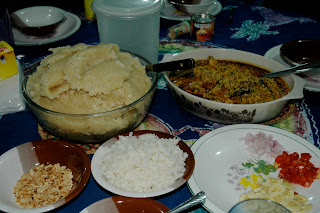 Goiters are common in Nigeria. Iodine deficiency is the main
contributor to endemic goiters but there is some evidence that the cassava
root, which is eaten as a vegetable, is also involved. The cassava is processed
and made into gari. To make gari, the cassava is peeled grated, and dehydrated-then
left to ferment. The fermented mash is then fried and eaten with fish soup.
Goiters are common in Nigeria. Iodine deficiency is the main
contributor to endemic goiters but there is some evidence that the cassava
root, which is eaten as a vegetable, is also involved. The cassava is processed
and made into gari. To make gari, the cassava is peeled grated, and dehydrated-then
left to ferment. The fermented mash is then fried and eaten with fish soup.The cassava contains a cyanogenic glucoside, linamarin, which must be removed prior to consumption by peeling, soaking, boiling, pounding, roasting, or drying. The ratio of iodine to thiocyanate in the diet has been shown to be related to the development of goiter. Processing removes most of the cyanate but the remaining amount can lead to goiters if the dietary iodine intake is low (Summary Proceedings of a Workshop on Trends and Prospects of cassava in the Third World-JS Sarma).

When I say goiters are common, I'm not talking about the little goiters that you need an ultrasound to see. I'm talking about grapefruit or even cantalope-sized goiters. These are goiters that have been growing sometimes for 10-20 years. When I arrive at the Nigerian Christian Hospital, the goiters start coming out of the woodwork. Last trip we performed 30 total thyroidectomies in 18 days. With so many waiting, the goiter patients are constantly juggling and manipulating to be next. Sometimes the patients enlist the local nurses or doctors to lobby for them so that they can be next on the "list". If we happen to take a patient out of order, it can lead to a "goiter riot".
 Every night on rounds, we are confronted by angry and saddened patients who didn't get their surgery that day. With their hands turned upward, each one asks "When is mine?" I always answer "Echi bu ubochi ozo" (Tomorrow is another day). The patients all laugh at my terrible pronunciation and the tension is dispelled. Then I tell them "Ntachi Obi"(Patience). We get them all done no matter what.
Every night on rounds, we are confronted by angry and saddened patients who didn't get their surgery that day. With their hands turned upward, each one asks "When is mine?" I always answer "Echi bu ubochi ozo" (Tomorrow is another day). The patients all laugh at my terrible pronunciation and the tension is dispelled. Then I tell them "Ntachi Obi"(Patience). We get them all done no matter what.
